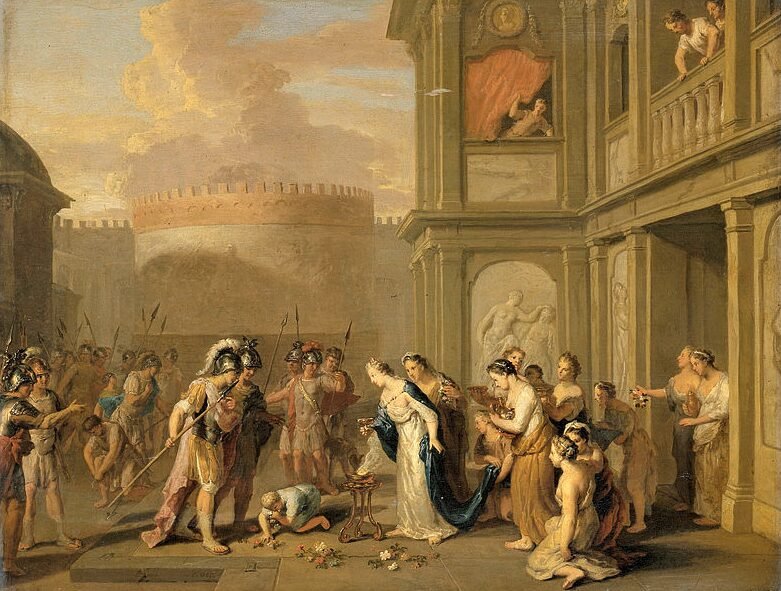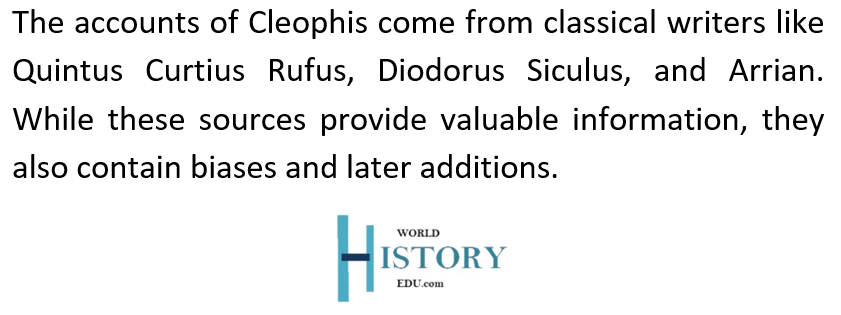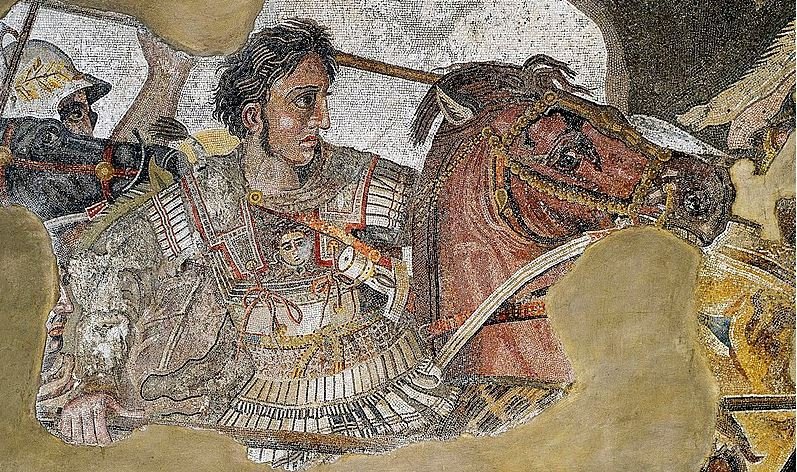Cleophis: The Assacani Queen who fought against Alexander the Great
Cleophis, known in Sanskrit as Kripa, was a prominent queen of the Assacani people. She played a crucial role during Alexander the Great‘s invasion in 326 BCE. As the mother of Assacanus, the Assacani war leader, her leadership became vital after her son’s death in battle.

Queen Cleophis presents wine to Alexander the Great following his conquest of Massaga.
The Assacani People
The Assacani, referred to as Ashvakas in Sanskrit, derive their name from “Ashva,” meaning horse. They inhabited regions of the Swat and Buner valleys in ancient Gandhara. These highlanders were known for their fierce independence and resistance to external control. Their clans were rebellious and maintained autonomy against invaders.
Alexander’s Campaign Against the Assacani
In 326 BCE, Alexander the Great extended his campaigns west of the Indus River, leading to a confrontation with the Assacani. The Assacani mobilized a formidable army to defend their homeland. According to Quintus Curtius Rufus, their forces included 20,000 cavalry, 38,000 infantry, and 30 elephants. Additionally, they enlisted 7,000 Kamboj mercenaries from Abhisara to bolster their ranks.

The Battle of Massaga
Despite their efforts, the Assacani were defeated in open battle. They retreated to the fortified city of Massaga. The siege of Massaga lasted several days—five or nine, based on different historical accounts. During this intense conflict, Assacanus was killed, creating a leadership vacuum.
How Cleophis took command of the army
Following her son’s death, Cleophis stepped into the leadership role. She rallied the Assacani women, organizing them to fight alongside the men. Her leadership was instrumental in continuing the city’s defense against Alexander’s forces. Under her command, the Assacani maintained their resistance, demonstrating remarkable resilience.
Negotiating with Alexander
Despite their valiant defense, Cleophis recognized that defeat was unavoidable. She decided to negotiate with Alexander to preserve her status and protect her people. Diodorus Siculus records that Cleophis sent valuable gifts to Alexander, expressing admiration for his greatness. She assured him of her compliance with the treaty terms, seeking a peaceful resolution.
Aftermath of the Siege
Classical sources like Curtius and Arrian mention that Cleophis was captured during the conflict, along with her young granddaughter. Despite the defeat, Alexander allowed Cleophis to retain her throne as a vassal, respecting her leadership and status. This lenient treatment contrasted with Alexander’s harsh actions elsewhere.
Cleophis demonstrated remarkable negotiation skills in dealing with Alexander. Her ability to secure favorable terms, allowing her to retain her status, indicates her diplomatic acumen.
While Cleophis was spared, Alexander’s retaliation against the Assacani was brutal. He ordered the burning of Massaga. Some scholars note that after promising safety to the surrendered Assacani, Alexander executed all their soldiers. Other strongholds, Ora and Aornus, were also attacked, likely resulting in significant casualties among the garrisons.
The Fate of the Kamboj Mercenaries
Alexander specifically targeted the Kamboj mercenaries who had fought alongside the Assacani. He pursued them relentlessly, surrounding them on a hill and killing all the mercenaries. Diodorus provides a detailed account, highlighting the fierce resistance of the Assacani women who fought alongside their men, using shields and physical force to impede the enemy.
Cleophis’s Legacy
Cleophis’s leadership during the siege of Massaga left a lasting legacy. Her ability to assume command after her son’s death and negotiate with Alexander showcased her strength and diplomatic skills. By retaining her status as a vassal, she ensured the continuity of Assacani leadership under Alexander’s rule.
The Myth of Cleophis and Alexander’s Son
Later classical writers, including Curtius and Justin, suggested that Alexander fathered a child with Cleophis. However, historians largely dismiss this claim as a later romantic invention without substantial evidence. Earlier accounts do not mention such a relationship, indicating that this story likely emerged from later traditions rather than historical fact.
Historical Perspectives
Modern historians view the story of Cleophis having a son with Alexander skeptically. The narrative appears to be a romantic addition to her legacy rather than a historical event. The primary sources focus more on her leadership and the military aspects of the conflict rather than personal relationships with Alexander.
Conclusion
Cleophis’s actions during the conflict had a lasting impact on Assacani culture and identity. Her leadership in the face of invasion reinforced the Assacani’s reputation as fierce and independent warriors. The defense of Massaga became a symbol of their resistance and resilience.


























